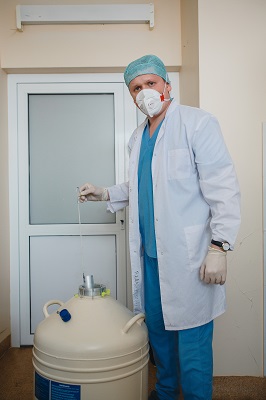News of Russian biobanks: Biobank of Bashkir State Medical University of the Ministry of Health of Russia
Bashkir State Medical University has implemented a large-scale project on collection, cataloging and responsible storage of biological materials under low-temperature and ultra-low temperature conditions for their subsequent use in translational analytical research, development of new drugs, and application in medical activities — reconstructive and plastic surgery.
The multidisciplinary Biobank has been functioning on the basis of the University BSMU the Russian Ministry of Health since 2020. In 2021, the Laboratory of Tissue Preservation and the Tissue Bank of the All-Russian Center for Eye and Plastic Surgery joined the Biobank. In 2022, Biobank became a structural subdivision of the Institute of Urology and Clinical Oncology, which also included the Laboratory of Molecular Genetics and the Laboratory of Immunology.
An important biological material stored in the Tissue Bank of BSMU are donor samples of connective tissue used in reconstructive and plastic surgery. Allogenic connective tissue biomaterials deprived of antigenic properties as a result of radiation sterilization procedure are used to replace volumetric defects of soft and skin tissues. Connective-tissue structures produced by patented technology have been used in clinical medicine for many years and have proven themselves in ophthalmology, traumatology, dentistry and maxillofacial surgery, otorhinolaryngology.
In 2023, the following types of grafts will be put into mass production: Allograft for the treatment of urinary incontinence (Surgical Set): Combined implant for the treatment of urinary incontinence (Surgical set), Allograft to accelerate sternal repair in cardiac surgery.
In 2024, a new trademark “Alloplant +” was created and new types of allogeneic grafts were released — regeneration stimulators for the treatment of severe forms of focal alopecia, treatment of bedsores, for intra-articular injections (synovial fluid prosthesis), treatment of gastric ulcers (endoscopic injections), thermal lesions and trophic ulcers (amniotic membrane), for cell cultivation and 3d printing, including biotcane-engineered constructions (ceramics, metal-ceramic), for aortic prosthetics, for conducting research on animal models, for restoring tendon integrity and repairing defects after neurosurgical operations.
The next type of biological samples — malignant neoplasms and related clinical information, tissue samples obtained during surgery, cell samples, tissues affected by other diseases, particularly neurodegenerative and of unknown nature — will be used to conduct research to find new drugs and improved therapies.
Collection of new materials, search for patients no longer takes a long time of employees of the analytical stage of projects. The Biobank of BSMU allows storing necessary cell collections for extended use by scientists.
In 2024, the Biobank of BGMU together with the Laboratory of Immunology of the Institute of Urology and Clinical Oncology developed a technology of sample preparation of prostate tumor tissue for subsequent sequencing of single cell transcriptome. Currently, 150 samples have been prepared for the analytical stage of the study. With this method, information on single cell transcript data will be available, which will enable the identification of gene expression and specific cellular subpopulations. This technology will also enable more precise identification of the molecular mechanisms of prostate oncogenesis, which will further contribute to the development of personalized methods of prostate cancer diagnosis and treatment. This will significantly increase the effectiveness of therapy and improve the prognosis of the disease for patients. In the future, this research may become the basis for the development of new methods of cancer treatment.





 +7 (965) 147 44 93
+7 (965) 147 44 93